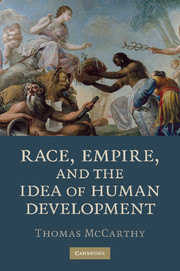Book contents
- Frontmatter
- Contents
- Acknowledgments
- Introduction
- Part One
- Part Two
- 5 What may we hope? Reflections on the idea of universal history in the wake of Kant
- 6 Liberal imperialism and the dilemma of development
- 7 From modernism to messianism: reflections on the state of “development”
- Conclusion: the presence of the past
- Index
- References
6 - Liberal imperialism and the dilemma of development
Published online by Cambridge University Press: 05 June 2012
- Frontmatter
- Contents
- Acknowledgments
- Introduction
- Part One
- Part Two
- 5 What may we hope? Reflections on the idea of universal history in the wake of Kant
- 6 Liberal imperialism and the dilemma of development
- 7 From modernism to messianism: reflections on the state of “development”
- Conclusion: the presence of the past
- Index
- References
Summary
Interrogating the tension in liberal thought between norms of equal respect and theories of sociocultural development is critical to understanding the relations of modern Europe to the rest of the world. From the settlement of the Americas and the formation of the East India and Royal African Companies in the seventeenth century to present-day neoimperialism, European (and later, American) dominion over non-Europeans has repeatedly been justified with conceptions of development, enlightenment, civilization and progress, which were deployed to reduce the cognitive dissonance between liberal universalism and liberal imperialism. At the same time, as we have been made increasingly aware by postcolonial scholarship, many of the classical liberal theorists were deeply involved with colonial affairs and constructed their political philosophies with a view to them.
In what follows, after (I) assembling a few scattered reminders of this involvement and briefly recalling the systematic formulation of the dilemma of development by Kant, I shall (II) examine the form that dilemma assumed in the detranscendentalized atmosphere of Mill's utilitarianism and basically retained thereafter. Two contrasting ways of dissolving the dilemma will be reviewed and rejected in sections III and IV, leading to the conclusion that it cannot be theoretically eliminated but may, perhaps, be politically displaced to a predicament with which we have to come to terms. Section V will consider some conditions for doing so.
- Type
- Chapter
- Information
- Race, Empire, and the Idea of Human Development , pp. 166 - 191Publisher: Cambridge University PressPrint publication year: 2009
References
- 1
- Cited by



